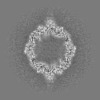[English] 日本語
 Yorodumi
Yorodumi- EMDB-0892: The cryo-EM structure of coxsackievirus A16 empty particle in com... -
+ Open data
Open data
- Basic information
Basic information
| Entry | Database: EMDB / ID: EMD-0892 | ||||||||||||||||||||||||||||||
|---|---|---|---|---|---|---|---|---|---|---|---|---|---|---|---|---|---|---|---|---|---|---|---|---|---|---|---|---|---|---|---|
| Title | The cryo-EM structure of coxsackievirus A16 empty particle in complex with Fab 18A7 | ||||||||||||||||||||||||||||||
 Map data Map data | The cryo-EM structure of coxsackievirus A16 empty particle in complex with Fab 18A7 | ||||||||||||||||||||||||||||||
 Sample Sample |
| ||||||||||||||||||||||||||||||
 Keywords Keywords | VIRUS | ||||||||||||||||||||||||||||||
| Function / homology |  Function and homology information Function and homology informationsymbiont-mediated suppression of host cytoplasmic pattern recognition receptor signaling pathway via inhibition of MDA-5 activity / picornain 2A / symbiont-mediated suppression of host mRNA export from nucleus / symbiont genome entry into host cell via pore formation in plasma membrane / picornain 3C / T=pseudo3 icosahedral viral capsid / host cell cytoplasmic vesicle membrane / ribonucleoside triphosphate phosphatase activity / viral capsid / nucleoside-triphosphate phosphatase ...symbiont-mediated suppression of host cytoplasmic pattern recognition receptor signaling pathway via inhibition of MDA-5 activity / picornain 2A / symbiont-mediated suppression of host mRNA export from nucleus / symbiont genome entry into host cell via pore formation in plasma membrane / picornain 3C / T=pseudo3 icosahedral viral capsid / host cell cytoplasmic vesicle membrane / ribonucleoside triphosphate phosphatase activity / viral capsid / nucleoside-triphosphate phosphatase / channel activity / monoatomic ion transmembrane transport / symbiont-mediated suppression of host NF-kappaB cascade / host cell cytoplasm / DNA replication / RNA helicase activity / endocytosis involved in viral entry into host cell / symbiont-mediated suppression of host gene expression / symbiont-mediated activation of host autophagy / RNA-directed RNA polymerase / cysteine-type endopeptidase activity / viral RNA genome replication / RNA-directed RNA polymerase activity / DNA-templated transcription / virion attachment to host cell / host cell nucleus / structural molecule activity / ATP hydrolysis activity / proteolysis / RNA binding / zinc ion binding / ATP binding / membrane Similarity search - Function | ||||||||||||||||||||||||||||||
| Biological species |   Coxsackievirus A16 Coxsackievirus A16 | ||||||||||||||||||||||||||||||
| Method | single particle reconstruction / cryo EM / Resolution: 3.13 Å | ||||||||||||||||||||||||||||||
 Authors Authors | He MZ / Xu LF | ||||||||||||||||||||||||||||||
| Funding support |  China, China,  United States, 9 items United States, 9 items
| ||||||||||||||||||||||||||||||
 Citation Citation |  Journal: Cell Host Microbe / Year: 2020 Journal: Cell Host Microbe / Year: 2020Title: Identification of Antibodies with Non-overlapping Neutralization Sites that Target Coxsackievirus A16. Authors: Maozhou He / Longfa Xu / Qingbing Zheng / Rui Zhu / Zhichao Yin / Zhenghui Zha / Yu Lin / Lisheng Yang / Yang Huang / Xiangzhong Ye / Shuxuan Li / Wangheng Hou / Yangtao Wu / Jinle Han / ...Authors: Maozhou He / Longfa Xu / Qingbing Zheng / Rui Zhu / Zhichao Yin / Zhenghui Zha / Yu Lin / Lisheng Yang / Yang Huang / Xiangzhong Ye / Shuxuan Li / Wangheng Hou / Yangtao Wu / Jinle Han / Dongxiao Liu / Zekai Li / Zhenqin Chen / Hai Yu / Yuqiong Que / Yingbin Wang / Xiaodong Yan / Jun Zhang / Ying Gu / Z Hong Zhou / Tong Cheng / Shaowei Li / Ningshao Xia /   Abstract: Hand, foot, and mouth disease is a common childhood illness primarily caused by coxsackievirus A16 (CVA16), for which there are no current vaccines or treatments. We identify three CVA16-specific ...Hand, foot, and mouth disease is a common childhood illness primarily caused by coxsackievirus A16 (CVA16), for which there are no current vaccines or treatments. We identify three CVA16-specific neutralizing monoclonal antibodies (nAbs) with therapeutic potential: 18A7, 14B10, and NA9D7. We present atomic structures of these nAbs bound to all three viral particle forms-the mature virion, A-particle, and empty particle-and show that each Fab can simultaneously occupy the mature virion. Additionally, 14B10 or NA9D7 provide 100% protection against lethal CVA16 infection in a neonatal mouse model. 18A7 binds to a non-conserved epitope present in all three particles, whereas 14B10 and NA9D7 recognize broad protective epitopes but only bind the mature virion. NA9D7 targets an immunodominant site, which may overlap the receptor-binding site. These findings indicate that CVA16 vaccines should be based on mature virions and that these antibodies could be used to discriminate optimal virion-based immunogens. | ||||||||||||||||||||||||||||||
| History |
|
- Structure visualization
Structure visualization
| Movie |
 Movie viewer Movie viewer |
|---|---|
| Structure viewer | EM map:  SurfView SurfView Molmil Molmil Jmol/JSmol Jmol/JSmol |
| Supplemental images |
- Downloads & links
Downloads & links
-EMDB archive
| Map data |  emd_0892.map.gz emd_0892.map.gz | 230.2 MB |  EMDB map data format EMDB map data format | |
|---|---|---|---|---|
| Header (meta data) |  emd-0892-v30.xml emd-0892-v30.xml emd-0892.xml emd-0892.xml | 18.4 KB 18.4 KB | Display Display |  EMDB header EMDB header |
| Images |  emd_0892.png emd_0892.png | 207.9 KB | ||
| Filedesc metadata |  emd-0892.cif.gz emd-0892.cif.gz | 6.3 KB | ||
| Archive directory |  http://ftp.pdbj.org/pub/emdb/structures/EMD-0892 http://ftp.pdbj.org/pub/emdb/structures/EMD-0892 ftp://ftp.pdbj.org/pub/emdb/structures/EMD-0892 ftp://ftp.pdbj.org/pub/emdb/structures/EMD-0892 | HTTPS FTP |
-Related structure data
| Related structure data |  6lhoMC  0887C  0888C  0889C  0890C  0891C  0894C  0895C  0897C  0898C  6lhaC 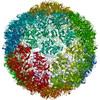 6lhbC  6lhcC  6lhkC  6lhlC  6lhpC  6lhqC  6lhtC M: atomic model generated by this map C: citing same article ( |
|---|---|
| Similar structure data |
- Links
Links
| EMDB pages |  EMDB (EBI/PDBe) / EMDB (EBI/PDBe) /  EMDataResource EMDataResource |
|---|---|
| Related items in Molecule of the Month |
- Map
Map
| File |  Download / File: emd_0892.map.gz / Format: CCP4 / Size: 244.1 MB / Type: IMAGE STORED AS FLOATING POINT NUMBER (4 BYTES) Download / File: emd_0892.map.gz / Format: CCP4 / Size: 244.1 MB / Type: IMAGE STORED AS FLOATING POINT NUMBER (4 BYTES) | ||||||||||||||||||||||||||||||||||||||||||||||||||||||||||||
|---|---|---|---|---|---|---|---|---|---|---|---|---|---|---|---|---|---|---|---|---|---|---|---|---|---|---|---|---|---|---|---|---|---|---|---|---|---|---|---|---|---|---|---|---|---|---|---|---|---|---|---|---|---|---|---|---|---|---|---|---|---|
| Annotation | The cryo-EM structure of coxsackievirus A16 empty particle in complex with Fab 18A7 | ||||||||||||||||||||||||||||||||||||||||||||||||||||||||||||
| Projections & slices | Image control
Images are generated by Spider. | ||||||||||||||||||||||||||||||||||||||||||||||||||||||||||||
| Voxel size | X=Y=Z: 1.307 Å | ||||||||||||||||||||||||||||||||||||||||||||||||||||||||||||
| Density |
| ||||||||||||||||||||||||||||||||||||||||||||||||||||||||||||
| Symmetry | Space group: 1 | ||||||||||||||||||||||||||||||||||||||||||||||||||||||||||||
| Details | EMDB XML:
CCP4 map header:
| ||||||||||||||||||||||||||||||||||||||||||||||||||||||||||||
-Supplemental data
- Sample components
Sample components
-Entire : Coxsackievirus A16
| Entire | Name:   Coxsackievirus A16 Coxsackievirus A16 |
|---|---|
| Components |
|
-Supramolecule #1: Coxsackievirus A16
| Supramolecule | Name: Coxsackievirus A16 / type: virus / ID: 1 / Parent: 0 / Macromolecule list: all / NCBI-ID: 31704 / Sci species name: Coxsackievirus A16 / Virus type: VIRION / Virus isolate: STRAIN / Virus enveloped: No / Virus empty: Yes |
|---|
-Macromolecule #1: VP1 protein
| Macromolecule | Name: VP1 protein / type: protein_or_peptide / ID: 1 / Number of copies: 1 / Enantiomer: LEVO |
|---|---|
| Source (natural) | Organism:   Coxsackievirus A16 Coxsackievirus A16 |
| Molecular weight | Theoretical: 33.106352 KDa |
| Sequence | String: GDPIADMIDQ TVNNQVNRSL TALQVLPTAA NTEASSHRLG TGVVPALQAA ETGASSNASD KNLIETRCVL NHHSTQETAI GNFFSRAGL VSIITMPTTD TQNTDGYVNW DIDLMGYAQL RRKCELFTYM RFDAEFTFVV AKPNGVLVPQ LLQYMYVPPG A PKPTSRDS ...String: GDPIADMIDQ TVNNQVNRSL TALQVLPTAA NTEASSHRLG TGVVPALQAA ETGASSNASD KNLIETRCVL NHHSTQETAI GNFFSRAGL VSIITMPTTD TQNTDGYVNW DIDLMGYAQL RRKCELFTYM RFDAEFTFVV AKPNGVLVPQ LLQYMYVPPG A PKPTSRDS FAWQTATNPS VFVKMTDPPA QVSVPFMSPA SAYQWFYDGY PTFGEHLQAN DLDYGQCPNN MMGTFSIRTV GT EKSPHSI TLRVYMRIKH VRAWIPRPLR NQPYLFKTNP NYKGNDIKCT STSRDKITTL UniProtKB: Genome polyprotein |
-Macromolecule #2: VP2 protein
| Macromolecule | Name: VP2 protein / type: protein_or_peptide / ID: 2 / Number of copies: 1 / Enantiomer: LEVO / EC number: picornain 2A |
|---|---|
| Source (natural) | Organism:   Coxsackievirus A16 Coxsackievirus A16 |
| Molecular weight | Theoretical: 27.557104 KDa |
| Sequence | String: SPSAEACGYS DRVAQLTIGN STITTQEAAN IVIAYGEWPE YCPDTDATAV DKPTRPDVSV NRFFTLDTKS WAKDSKGWYW KFPDVLTEV GVFGQNAQFH YLYRSGFCVH VQCNASKFHQ GALLVAVLPE YVLGTIAGGT GNENSHPPYA TTQPGQVGAV L THPYVLDA ...String: SPSAEACGYS DRVAQLTIGN STITTQEAAN IVIAYGEWPE YCPDTDATAV DKPTRPDVSV NRFFTLDTKS WAKDSKGWYW KFPDVLTEV GVFGQNAQFH YLYRSGFCVH VQCNASKFHQ GALLVAVLPE YVLGTIAGGT GNENSHPPYA TTQPGQVGAV L THPYVLDA GIPLSQLTVC PHQWINLRTN NCATIIVPYM NTVPFDSALN HCNFGLLVIP VVPLDFNAGA TSEIPITVTI AP MCAEFAG LRQAVKQ UniProtKB: Genome polyprotein |
-Macromolecule #3: VP3 protein
| Macromolecule | Name: VP3 protein / type: protein_or_peptide / ID: 3 / Number of copies: 1 / Enantiomer: LEVO / EC number: picornain 2A |
|---|---|
| Source (natural) | Organism:   Coxsackievirus A16 Coxsackievirus A16 |
| Molecular weight | Theoretical: 26.654295 KDa |
| Sequence | String: GIPTELKPGT NQFLTTDDGV SAPILPGFHP TPPIHIPGEV HNLLEICRVE TILEVNNLKT NETTPMQRLC FPVSVQSKTG ELCAAFRAD PGRDGPWQST ILGQLCRYYT QWSGSLEVTF MFAGSFMATG KMLIAYTPPG GNVPADRITA MLGTHVIWDF G LQSSVTLV ...String: GIPTELKPGT NQFLTTDDGV SAPILPGFHP TPPIHIPGEV HNLLEICRVE TILEVNNLKT NETTPMQRLC FPVSVQSKTG ELCAAFRAD PGRDGPWQST ILGQLCRYYT QWSGSLEVTF MFAGSFMATG KMLIAYTPPG GNVPADRITA MLGTHVIWDF G LQSSVTLV VPWISNTHYR AHARAGYFDY YTTGIITIWY QTNYVVPIGA PTTAYIVALA AAQDNFTMKL CKDTEDIEQT AN IQ UniProtKB: Genome polyprotein |
-Experimental details
-Structure determination
| Method | cryo EM |
|---|---|
 Processing Processing | single particle reconstruction |
| Aggregation state | particle |
- Sample preparation
Sample preparation
| Buffer | pH: 7.4 |
|---|---|
| Vitrification | Cryogen name: ETHANE |
- Electron microscopy
Electron microscopy
| Microscope | FEI TITAN KRIOS |
|---|---|
| Image recording | Film or detector model: GATAN K2 SUMMIT (4k x 4k) / Detector mode: SUPER-RESOLUTION / Average electron dose: 40.0 e/Å2 |
| Electron beam | Acceleration voltage: 300 kV / Electron source:  FIELD EMISSION GUN FIELD EMISSION GUN |
| Electron optics | Illumination mode: FLOOD BEAM / Imaging mode: BRIGHT FIELD |
| Experimental equipment |  Model: Titan Krios / Image courtesy: FEI Company |
 Movie
Movie Controller
Controller


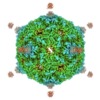




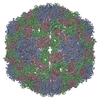






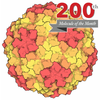
 Z (Sec.)
Z (Sec.) Y (Row.)
Y (Row.) X (Col.)
X (Col.)


















